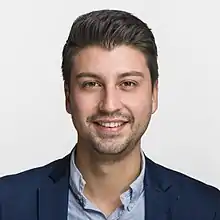Fabian Molina | |
|---|---|
 Official portrait, 2019 | |
| Member of National Council (Switzerland) | |
| Assumed office 15 March 2018 | |
| Preceded by | Tim Guldimann |
| Constituency | Canton of Zürich |
| President of Young Socialists Switzerland | |
| In office 16 March 2014 – 31 May 2016 | |
| Personal details | |
| Born | Fabian Molina 8 July 1990 Uster, Switzerland |
| Citizenship |
|
| Political party | Social Democratic Party |
| Residence | Zürich, Switzerland |
| Alma mater | University of Zürich (dropped out) |
| Website | Official website |
Fabian Molina (born 8 July 1990) is a Swiss politician who currently serves on the National Council (Switzerland) for the Social Democratic Party since 2018.[1] He succeeded Tim Guldimann and became the youngest member of the National Council (Switzerland) ever to be elected aged 28.[2] He previously served as President of the Young Socialists between 2014 and 2016 as well as on the Cantonal Council of Zürich from 2017 to 2018.[3] Since 2019, he is co-president of Swissaid.[4]
Early life and education
Molina was born 8 July 1990 in Uster, Switzerland to Jorge Molina, a print shop owner, who came to Switzerland from Chile in 1982 after being imprisoned thirteen times for socialist activisim and being a supporter of Salvador Allende.[5][6] He has two elder half-brothers and a younger brother and primarily was raised in Illnau-Effretikon. Molina completed his Matura in 2011, after failing one year prior and continued to study at University of Zürich where he majored in History and Philosophy (didn't graduate).[7]
Political career
Fabian Molina joined the SP in 2006. From 2007 to 2009, he was a board member of SP Illnau-Effretikon. At the same time, in 2008, he founded the social democratic youth wing (Juso) Illnau-Effretikon. In 2009, he was elected Co-President of the Juso Canton Zurich. In 2010, he was elected to the municipal council of Illnau-Effretikon, where he served until his resignation in 2016.[8] In 2015, he was a candidate for the Swiss National Council on the list of SP in the Canton of Zurich.[9] On national level, Fabian Molina presided the Juso Switzerland from March 2014 and announced his resignation as a president in June 2016 at Juso Switzerland's 2016 annual meeting and expressed a desire for a female successor.[10] In August 2017, he joined the Zurich Cantonal Council for the Pfäffikon constituency.[8] On 15 March 2018 he moved up as National Council after his predecessor Tim Guldimann's resignation.[11][12] In the 2019 parliamentary elections, Molina was able to defend its seat in the National Council with 81,905 votes.[13]
Political profile
Molina was Youth Secretary at the Swiss national labour union Unia from 2011 to 2014. He is also a member of Amnesty International, Greenpeace, Group Switzerland without Army (GSoA), Public Eye, and Solidar Suisse. From early 2017 to 2018, Molina held a position as a research assistant at the Swiss non-governmental organisation Swissaid[8] and has been Co-President since 6 June 2019.[14]
A prominent figure in national media, he has raised regular attention both in national and international press. He called, for instance, to hoist the multi-coloured Peace Flag instead of the Swiss Flag on 1 August 2014 (Switzerland's national day) to commemorate 100 years of the general mobilization for World War I.[15] In 2015, in cooperation with other political groups, Molina and his Juso took the referendum against the new Intelligence Service Act (Nachrichtendienstgesetz).[16] Furthermore, he took a leading role in the vote on the popular initiative "Stop Speculation on Food Crops" ("Keine Spekulation mit Nahrungsmitteln!") that came to a popular vote on 2 February 2016, and was rejected.[17]
References
- ↑ "Ratsmitglied ansehen". www.parlament.ch. Retrieved 2023-09-04.
- ↑ "Fabian Molina: Zu Besuch in der WG des neuen SP-Nationalrats". Schweizer Illustrierte (in Swiss High German). Retrieved 2023-09-04.
- ↑ "Zürcher Fabian Molina zum neuen JUSO-Präsidenten gewählt". SWI swissinfo.ch (in German). 2014-03-15. Retrieved 2023-09-04.
- ↑ AG, Station. ""Without agriculture we cannot live"". Swissaid. Retrieved 2023-09-04.
- ↑ "Fabian Molina Juso-Präsident: Herkunft Eltern Familie privat". Schweizer Illustrierte (in Swiss High German). Retrieved 2023-09-04.
- ↑ Bild), Michael Rüegg (Text und (2012-10-21). "Zürich - Fabian Molina: Der brave Revoluzzer der Jungsozialisten". Limmattaler Zeitung (in German). Retrieved 2023-09-04.
- ↑ Vuille, Christof (2017-02-01). "Jetzt droht SP-Youngster mit Polit-Comeback: Juso-Molina bricht Studium in Spanien ab". Blick (in Swiss High German). Retrieved 2023-09-04.
- 1 2 3 "Fabian Molina". SP Schweiz (in German). Retrieved October 24, 2018.
- ↑ Hotz, Stefan (October 19, 2015). "SP erobert überraschend zwei zusätzliche Sitze | NZZ". Neue Zürcher Zeitung (in Swiss High German). Retrieved October 24, 2018.
- ↑ Marti, Simon (12 March 2016). "Fabian Molina (25) konzentriert sich aufs Studieren: Juso-Präsident tritt zurück". Blick (in German). Retrieved October 24, 2018.
- ↑ "Ratsmitglied ansehen". www.parlament.ch (in German).
- ↑ "Zweieinhalb Jahre im Amt – SP-Nationalrat Tim Guldimann hat genug". Schweizer Radio und Fernsehen (SRF) (in German). February 18, 2018. Retrieved October 24, 2018.
- ↑ "Zürcher Nationalratssitze – Sechs zusätzliche Sitze für das Klima". Schweizer Radio und Fernsehen (SRF) (in German). October 19, 2019. Retrieved October 28, 2019.
- ↑ "SWISSAID: Neues Co-Präsidium mit Bastienne Joerchel und Fabian Molina". SWISSAID. June 6, 2019. Archived from the original on July 4, 2019. Retrieved October 28, 2019.
- ↑ Lenz, Von Christoph (29 July 2014). "Angst vor Nationalismus: Juso-Chef will keine Schweizer Fahnen am 1. August". Blick (in German). Retrieved October 24, 2018.
- ↑ "Nachrichtendienst-Gesetz – Referendum gegen das Nachrichtendienstgesetz steht". Schweizer Radio und Fernsehen (SRF) (in German). February 4, 2016. Retrieved October 24, 2018.
- ↑ Bundeskanzlei, BK. "Politische Rechte, Volksinitiativen" (in German). Retrieved October 24, 2018.
External links
- Official website (in German)
- Biography of Fabian Molina on the website of the Swiss Parliament. (German)